|
|
|
Sort Order |
|
|
|
Items / Page
|
|
|
|
|
|
|
| Srl | Item |
| 1 |
ID:
138088
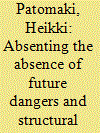

|
|
|
|
|
| Summary/Abstract |
One of the great appeals of securitization theory, and a major reason for its success, has been its usefulness as a tool for empirical research: an analytic framework capable of practical application. However, the development of securitization has raised several criticisms, the most important of which concern the nature of securitization theory. In fact, the appropriate methods, the research puzzles and type of evidence accepted all derive to a great extent from the kind of theory scholars bequeath their faith to. This Forum addresses the following questions: What type of theory (if any) is securitization? How many kinds of theories of securitization do we have? How can the differences between theories of securitization be drawn? What is the status of exceptionalism within securitization theories, and what difference does it make to their understandings of the relationship between security and politics? Finally, if securitization commands that leaders act now before it is too late, what status has temporality therein? Is temporality enabling securitization to absorb risk analysis or does it expose its inherent theoretical limits?
|
|
|
|
|
|
|
|
|
|
|
|
|
|
|
|
| 2 |
ID:
100477
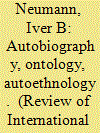

|
|
|
| 3 |
ID:
175117


|
|
|
|
|
| Summary/Abstract |
Under the banner of martial empiricism, we advance a distinctive set of theoretical and methodological commitments for the study of war. Previous efforts to wrestle with this most recalcitrant of phenomena have sought to ground research upon primary definitions or foundational ontologies of war. By contrast, we propose to embrace war’s incessant becoming, making its creativity, mutability and polyvalence central to our enquiry. Leaving behind the interminable quest for its essence, we embrace war as mystery. We draw on a tradition of radical empiricism to devise a conceptual and contextual mode of enquiry that can follow the processes and operations of war wherever they lead us. Moving beyond the instrumental appropriations of strategic thought and the normative strictures typical of critical approaches, martial empiricism calls for an unbounded investigation into the emergent and generative character of war. Framing the accompanying special issue, we outline three domains around which to orient future research: mobilization, design and encounter. Martial empiricism is no idle exercise in philosophical speculation. It holds the promise of a research agenda apposite to the task of fully contending with the momentous possibilities and dangers of war in our time.
|
|
|
|
|
|
|
|
|
|
|
|
|
|
|
|
| 4 |
ID:
160885
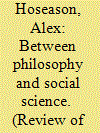

|
|
|
|
|
| Summary/Abstract |
As a discipline, IR returns repeatedly to the ‘problem of harm’; debating what harm is or should mean. Exploring the discipline through this lens allows us to understand it as contributing to a broader process of negotiation centred on harm as a principle of restraint. However, existing accounts of what harm means for IR are challenged by the scale and visibility of large-scale harm. This article attempts to push beyond recent accounts of harm by Linklater and Mitchell by examining their respective framings of the relationship between harm and its explanation in IR. Building on their limitations, I propose a framework centred on arguments for ontological realism and structure as a focus for explanation. The resulting ontology sustains the concerns of both while: (a) more fully characterising the relationship between explanation and values in IR; and (b) providing a more adequate account of the role of abstraction. In developing upon existing accounts, this article seeks to provide a stronger ground for the analysis of harm in IR. More broadly, it contributes to contemporary debates centred on the relationship between ontology and values with a view to clarifying the nature of explanation in IR as a social science.
|
|
|
|
|
|
|
|
|
|
|
|
|
|
|
|
| 5 |
ID:
197519


|
|
|
|
|
| Summary/Abstract |
This article provides a review and commentary on the articles in this special issue, which offer alter-IRs as approaches to bringing climate change into international relations theory and practice as a force or phenomenon that can transform theory and practice. I summarize the articles, as I read them, and suggest that this is a largely futile task. Is description of new ontologies and epistemologies sufficient to bring climate change into IR in a meaningful way? If the discipline is so constrained by its deeply rooted ontology and epistemology, why make the effort to attempt this transformation? And given that our task as philosophers is to ‘change the world’, what are the theories and practices that will make this happen?
|
|
|
|
|
|
|
|
|
|
|
|
|
|
|
|
| 6 |
ID:
141216
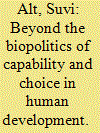

|
|
|
|
|
| Summary/Abstract |
International development is one of the primary biopolitical problematics of the 21st century. Yet, biopolitical critiques of ‘human development’ tend to leave the framework’s ontological underpinnings largely unexplored. This article seeks to remedy this gap by problematising the notions of ‘capability’ and ‘choice’ in human development through an engagement with Martin Heidegger’s critique of the metaphysics of modernity. The article argues that underlying human development is an ontology that enframes human beings as a contingent, orderable, and calculable reserve of capabilities. The enframing of choice in turn conceals the limitedness of the conditions within which choice can happen. As opposed to such liberal choice, the article puts forward an ontological notion of ‘decision’, which entails understanding the world as an openness that resists any final determination of being. A politics that draws its involvement in the world from the openness of being entails the ability to question critically even benevolent and supposedly emancipatory projects when they lack recognition of their own ontological commitments and of the limitations that those commitments impose on people’s lives. A re-politicisation of human development thus requires exposing the paradigm’s ontological limits, but it also demands practical political engagement in the factical situations that beings inhabit.
|
|
|
|
|
|
|
|
|
|
|
|
|
|
|
|
| 7 |
ID:
123590
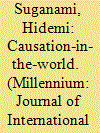

|
|
|
|
|
| Publication |
2013.
|
| Summary/Abstract |
This article examines critical realists' key contention that 'causing', or the operation of causal powers, is real or mind-independent. Against their opponents (causal idealists), they point out the (seeming) empirical obviousness of the mind-independence of causal powers, causal idealism's lack of 'ontological grounding', its 'epistemic fallacy' and so on. The validity or force of such arguments is ultimately dubious, however. Still, the understanding that causal powers are real is a necessary presupposition of scientific knowledge production and application and of our everyday thinking and practice; realists and idealists can converge on this point. Moreover, there is nothing in causal idealism as such that is incompatible with critical realists' key insight that causal laws should be understood as stating the ways things work, producing observable regularities only in closed systems and that regularities are not an intrinsic feature of causal relations. I conclude by exploring the implications of this line of thinking for the study of world politics, endorsing a move from a search for parsimonious theories that explain regular patterns observable in the international system towards a historical study of global social relations, which pays attention to causal complexes, diversity of historical contexts and the contested nature of causal interpretations.
|
|
|
|
|
|
|
|
|
|
|
|
|
|
|
|
| 8 |
ID:
104354
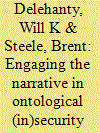

|
|
|
|
|
| Publication |
2011.
|
| Summary/Abstract |
Ontological security theory (OST) provides a unique account of how state Self-identity is formed and reformed in international relations. OST postulates that state Self-identity is usefully understood by inquiring into the foundation of a state's sense of Self: its autobiographical narrative. We seek to amend this line of argument by further suggesting that the autobiographical narratives of states are 'gendered'. Feminist theorizing about the relationship between gender and power implies that the dominant autobiographical narrative of state Self-identity is 'gendered' masculine. The power of this masculinized autobiographical narrative flows from an 'internal othering' process of counter 'feminine' autobiographical narratives that exist alongside the masculinized autobiographical narrative. Our goal is to suggest that opportunities do arise for counter 'feminine' narratives to challenge the dominant autobiographical narrative due to their interdependence and we explicate two practices by which masculinized narratives can be engaged, challenged and disrupted.
|
|
|
|
|
|
|
|
|
|
|
|
|
|
|
|
| 9 |
ID:
138085
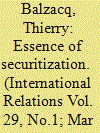

|
|
|
|
|
| Summary/Abstract |
One of the great appeals of securitization theory, and a major reason for its success, has been its usefulness as a tool for empirical research: an analytic framework capable of practical application. However, the development of securitization has raised several criticisms, the most important of which concern the nature of securitization theory. In fact, the appropriate methods, the research puzzles and type of evidence accepted all derive to a great extent from the kind of theory scholars bequeath their faith to. This Forum addresses the following questions: What type of theory (if any) is securitization? How many kinds of theories of securitization do we have? How can the differences between theories of securitization be drawn? What is the status of exceptionalism within securitization theories, and what difference does it make to their understandings of the relationship between security and politics? Finally, if securitization commands that leaders act now before it is too late, what status has temporality therein? Is temporality enabling securitization to absorb risk analysis or does it expose its inherent theoretical limits?
|
|
|
|
|
|
|
|
|
|
|
|
|
|
|
|
| 10 |
ID:
160379
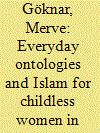

|
|
|
|
|
| Summary/Abstract |
This article discusses the significance of everyday Islam as a gendered locus for socialisation. Religious practices and conversations about religion comprise a major part of quotidian activities in the two villages in northwestern Turkey where the research took place. Men and women's everyday interaction with Islam dominated their ways of thinking, acting and especially socialising. Exploring the ways in which the Qur’an and the Hadith as discursive resources of Islam influence power relations and everyday practices, the article argues that Islamic morality co-exists with everyday Islam.
|
|
|
|
|
|
|
|
|
|
|
|
|
|
|
|
| 11 |
ID:
147712
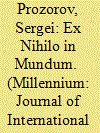

|
|
|
|
|
| Summary/Abstract |
In this reply to Vassilios Paipais’s review of my Void Universalism books I focus on two main points of my disagreement with Paipais. The first concerns the possibility of deriving universalist axioms of world politics from the ontology of the void discussed in the first volume, Ontology and World Politics. While Paipais rejects such a possibility and posits a contentless ontology of the political, I argue that it is possible to derive from void ontology the political axioms of community, equality and freedom understood as attributes of indiscernible ‘whatever being’. The second pertains to the limitations on the world-political subject addressed in the second volume, Theory of the Political Subject. While Paipais is entirely correct in arguing that my notion of political subjectivity combines purism on the level of content with prudentialism with regard to form, I demonstrate that this combination is not a contradiction but is rather the precondition of politics as free praxis, whereby the politicisation of particular worlds in accordance with universal axioms always remains up to the subject.
|
|
|
|
|
|
|
|
|
|
|
|
|
|
|
|
| 12 |
ID:
170758
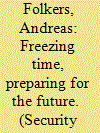

|
|
|
|
|
| Summary/Abstract |
This article analyses stockpiling as a security device that hoards time, stores power and buffers disruptions. The stockpile is a temporal matter of security by virtue of its ability to freeze time and to prepare for future emergencies. Stockpiling is informed by anticipations of threats but also materially underpins expectations. After unpacking the temporal ontology of stockpiling, the article traces its history as a security device and technology of power. Stockpiling enabled the emergence of the earliest states by establishing the means to store surpluses and centralize power. In modernity, stores became more dispersed as money, commodity exchange and new infrastructures made it possible to procure resources through circulation. In the 20th century, stockpiling became a reflexive security device reactive to risks associated with the disruption of these circulations. Finally, the article illuminates the role of reserves in contemporary German catastrophe preparedness to show that stockpiling remains an important security technique. Yet fiscal austerity and budgetary constraints limit security stockpiling. To compensate for the absence of public security stores, the government is prompting citizens to establish emergency stockpiles. The article offers a theoretical, historical and empirical engagement with stockpiling and thereby further elucidates the material politics of anticipation.
|
|
|
|
|
|
|
|
|
|
|
|
|
|
|
|
| 13 |
ID:
090163
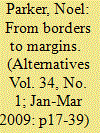

|
|
|
|
|
| Publication |
2009.
|
| Summary/Abstract |
While concepts of a postinternational politics properly highlight the constant variance of entities in play in international relations, the approach lacks an ontology that shows how such an unstable variety of types of players can coexist in a common field in the first place. This article draws upon Deleuze's philosophy to set out an ontology in which the continual reformulation of entities in play in "postinternational" society can be grasped. This entails a strategic shift from speaking about the "borders" between sovereign states to referring instead to the "margins" between a plethora of entities that are ever open to modifications of identity. The concept of the margin possesses a much wider reach than borders, and focuses continual attention on the meetings and interactions between a range of indeterminate entities whose interactions may determine both themselves and the types of entity that are in play.
|
|
|
|
|
|
|
|
|
|
|
|
|
|
|
|
| 14 |
ID:
129484
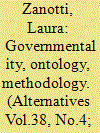

|
|
|
|
|
| Publication |
2013.
|
| Summary/Abstract |
Some critical international relations scholars have adopted theories of governmentality both as a heuristic framework for exploring modalities and functions of power and as a descriptive tool to explore the oppressive effects of global liberalism. I argue that, as a descriptive tool, much governmentality literature remains rooted in the same substantialist ontology and epistemology as the liberal discourses it seeks to criticize. This ontological orientation especially has a bearing on conceptualizations of political agency, which remain confined to the liberal struggle of power and freedom. I suggest that reimagining political agency calls for a reorganization of the ontological and epistemological framework of international relations in non-substantialist ways. The analysis maps non-substantialist positions across disciplinary lines. By treating power and subjects as deeply imbricated, non-substantialist ontologies examine political engagements as processes of hybridization aimed at producing practical effects in specific contexts.
|
|
|
|
|
|
|
|
|
|
|
|
|
|
|
|
| 15 |
ID:
117840
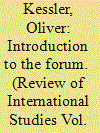

|
|
|
|
|
| Publication |
2012.
|
| Summary/Abstract |
In the last couple of years, Critical Realism has established itself as an alone-standing intellectual movement in International Relations (IR). It not only seeks to challenge the idea of the middle ground on which most of the more moderate versions of constructivist thought base their convictions, but it also seeks to provide own answers to basic scientific problems around the relationship between facts and values, causation and causality, or agents and structure. If one would want to characterise Critical Realist positions, one has to point to their attempted resurrection of ontology. Taking inspiration, in particular, from Bhaskar's Possibility of Naturalism and subsequent works, different strands of Critical Realism are tied together in their conviction that epistemology has had too much influence on scientific debates ever since Kant changed the structure of philosophical reasoning by asking how objects were determined by concepts rather than the other way round. The prevalent focus on epistemological questions is not only biased and asks the wrong questions, but it starts from false premises in the first place, as Wight and Patomäki once put it: every theory of knowledge must also logically presuppose a theory of what the world is like (ontology) for knowledge (epistemology) to be possible.
|
|
|
|
|
|
|
|
|
|
|
|
|
|
|
|
| 16 |
ID:
138084
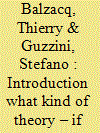

|
|
|
|
|
| Summary/Abstract |
One of the great appeals of securitization theory, and a major reason for its success, has been its usefulness as a tool for empirical research: an analytic framework capable of practical application. However, the development of securitization has raised several criticisms, the most important of which concern the nature of securitization theory. In fact, the appropriate methods, the research puzzles and type of evidence accepted all derive to a great extent from the kind of theory scholars bequeath their faith to. This Forum addresses the following questions: What type of theory (if any) is securitization? How many kinds of theories of securitization do we have? How can the differences between theories of securitization be drawn? What is the status of exceptionalism within securitization theories, and what difference does it make to their understandings of the relationship between security and politics? Finally, if securitization commands that leaders act now before it is too late, what status has temporality therein? Is temporality enabling securitization to absorb risk analysis or does it expose its inherent theoretical limits?
|
|
|
|
|
|
|
|
|
|
|
|
|
|
|
|
| 17 |
ID:
197515


|
|
|
|
|
| Summary/Abstract |
‘Change’ or ‘transformation’ are longstanding preoccupations of both International Relations (IR) and global climate change politics scholarship. Yet, the two fields largely occupy independent axiological, epistemological, normative, and ontological spaces that have led to misunderstandings, mutual criticisms, and a lack of serious engagement on these questions. The result is missed opportunities to transform IR, misdiagnoses of political dynamics of climate change, and, perversely, the limited influence of political analysis on wider climate change scholarship. This article identifies understandings of change and transformation relevant to both fields and introduces a productive epistemological and ontological shift for analyzing and normatively engaging with change in the face of uncertainty. It then introduces practical research strategies for policy-relevant and forward-looking scholarship that moves from explaining change to identifying causal logics and dynamic processes that can reinforce (or undermine) change and transformation. It concludes with illustrative analyzes of trajectories and possible limits of two macro policy changes with transformative potential: the 1.5-degree Celsius aspirational target in the Paris Agreement, and the proliferation of ‘net zero’ policies around the world.
|
|
|
|
|
|
|
|
|
|
|
|
|
|
|
|
| 18 |
ID:
183221
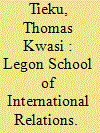

|
|
|
|
|
| Summary/Abstract |
The article explores the Legon School of International Relations (LSIR) which is the research, teaching, and academic programming of International Relations (IR) at the University of Ghana, Legon. The LSIR came out of attempts to decolonise knowledge production, dissemination, and academic programing in Ghana in early 1960s. The article shows that the LSIR is decolonial in theoretical perspective, grounded in southern epistemologies, relational in ontology, qualitative in methodology, practice-based, and it is equity-oriented. Although the LSIR scholarship as a package is distinctive, some of its ideas overlap with the work of several contemporary IR communities in the West. The article highlights implications of the LSIR story for the IR communities in the West and the value of paying close attention to the works of IR centres of scholarship in Africa.
|
|
|
|
|
|
|
|
|
|
|
|
|
|
|
|
| 19 |
ID:
097733
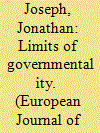

|
|
|
|
|
| Publication |
2010.
|
| Summary/Abstract |
Foucault's concept of governmentality goes beyond the narrow limits of state power to look at how these societies employ more subtle methods of power exercised through a network of institutions, practices, procedures and techniques which act to regulate social conduct. This approach is now gaining influence in International Relations and this piece reflects on this emerging field and tries to steer the debate in a certain direction. It is concerned to explore the limitations of the concept as a social theoretical explanation and also as an account of the international domain. It suggests that because the international domain is highly uneven, governmentality can only usefully be applied to those areas that might be characterized as having an advanced form of liberalism. To explain these limits requires that governmentality be set within a wider theorization of social context.
|
|
|
|
|
|
|
|
|
|
|
|
|
|
|
|
| 20 |
ID:
099792
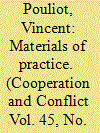

|
|
|
|
|
| Publication |
2010.
|
| Summary/Abstract |
In this article I argue that the Cartesian dualism informing dominant theories of International Relations (IR) has limited analytical purchase at the level of practice. The materials that enable and constrain contemporary diplomatic practices between NATO and Russia seamlessly combine natural, cultural and organizational artefacts: nuclear warheads take on a symbolic life of their own; linguistic formulations transform into 'things'; and committee meetings inscribe intersubjective dynamics with a new materiality. To materialist theories à la neo-realism, practice theory shows that material objects matter not because they have an immanent meaning, but rather because, in becoming part of social relations, they acquire a form of agency of their own, making people do things they would not have done otherwise. To IR constructivism, this article demonstrates that it is not only people who attach meanings to things; things also attach meanings to people. Enmeshed in social relations, material objects often acquire an epistemic life of their own that may affect, in turn, the very people who constructed them.
|
|
|
|
|
|
|
|
|
|
|
|
|
|
|
|
|
|
|
|
|